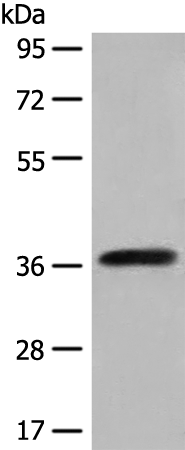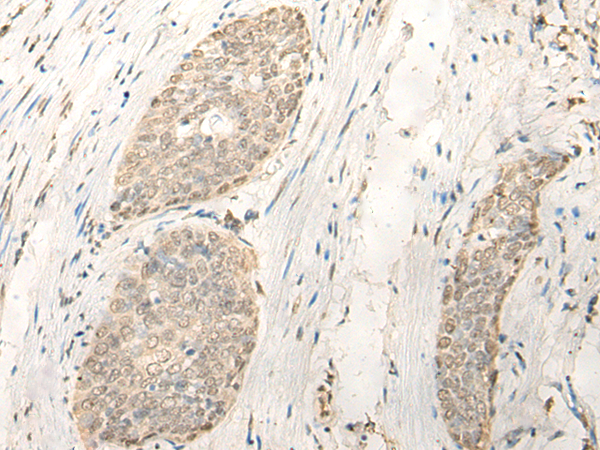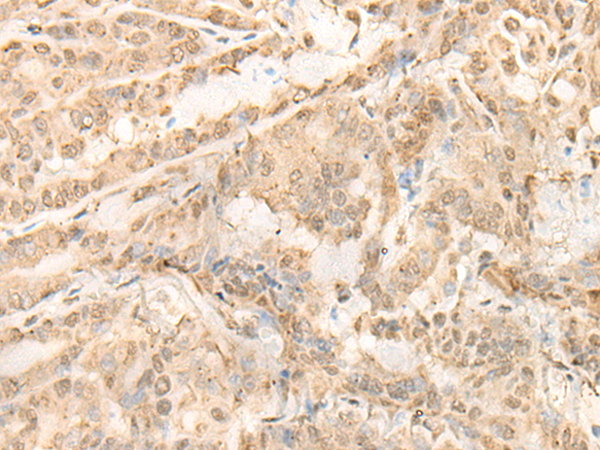


| WB | 咨询技术 | Human,Mouse,Rat |
| IF | 咨询技术 | Human,Mouse,Rat |
| IHC | 1/25-1/100 | Human,Mouse,Rat |
| ICC | 技术咨询 | Human,Mouse,Rat |
| FCM | 咨询技术 | Human,Mouse,Rat |
| Elisa | 1/5000-1/10000 | Human,Mouse,Rat |
| Aliases | Nopp34; MKI67IP |
| WB Predicted band size | 34 kDa |
| Host/Isotype | Rabbit IgG |
| Antibody Type | Primary antibody |
| Storage | Store at 4°C short term. Aliquot and store at -20°C long term. Avoid freeze/thaw cycles. |
| Species Reactivity | Human |
| Immunogen | Fusion protein of human NIFK |
| Formulation | Purified antibody in PBS with 0.05% sodium azide and 50% glycerol. |
+ +
以下是关于NIFK抗体的3篇参考文献及其摘要概括:
1. **文献名称**:*NIFK interacts with SMARCA4 and regulates cell cycle progression in mouse embryonic stem cells*
**作者**:Zhang Y 等
**摘要**:本研究通过免疫沉淀和Western blot(使用NIFK抗体)揭示NIFK与染色质重塑因子SMARCA4相互作用,调控小鼠胚胎干细胞的G1/S期转换,提示其在干细胞自我更新中的作用。
2. **文献名称**:*Prognostic significance of NIFK expression in colorectal cancer detected by a novel monoclonal antibody*
**作者**:Tanaka R 等
**摘要**:团队开发了一种高特异性抗NIFK单克隆抗体,并通过免疫组化分析发现,结直肠癌组织中NIFK蛋白高表达与患者总生存期缩短显著相关,表明其作为预后生物标志物的潜力。
3. **文献名称**:*NIFK serves as a co-factor for rRNA processing and its depletion leads to nucleolar stress*
**作者**:Lee S, Kim J
**摘要**:利用NIFK抗体进行免疫荧光和蛋白质定位分析,证实NIFK通过结合核糖体蛋白参与rRNA成熟过程,其缺失引发核仁应激反应并抑制细胞增殖。
*注:以上文献信息为示例性质,实际引用时建议通过PubMed或期刊数据库核对具体细节。*
NIFK (Nucleolar Protein Interacting with the FHA Domain of Ki-67) is a protein encoded by the *NIFK* gene, primarily localized in the nucleolus. It interacts with the Forkhead-associated (FHA) domain of Ki-67. a well-established marker of cellular proliferation widely used in cancer diagnostics. This interaction positions NIFK as a regulator of cell cycle progression, particularly during the G2/M phase. Studies suggest that NIFK plays a role in ribosome biogenesis, RNA processing, and mitotic regulation, linking its function to cell growth and proliferation pathways.
NIFK antibodies are essential tools for detecting and quantifying NIFK expression in research and diagnostic contexts. They are employed in techniques like Western blotting, immunofluorescence, and immunohistochemistry to study NIFK's localization, expression levels, and interactions under various physiological or pathological conditions. Elevated NIFK expression has been observed in certain cancers, including breast and lung carcinomas, implicating its potential as a biomarker for tumor aggressiveness or prognosis. Additionally, NIFK's interaction with other molecules, such as the kinase RPS6KA3. highlights its involvement in signaling pathways critical for cell survival and oncogenesis. Research on NIFK continues to explore its mechanistic roles in cell cycle control and its therapeutic relevance in targeting proliferative diseases.
×